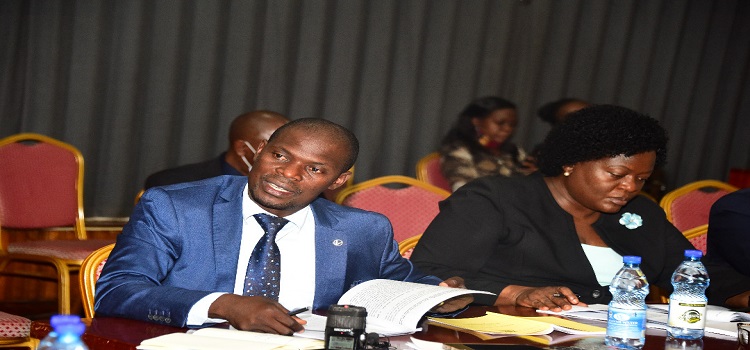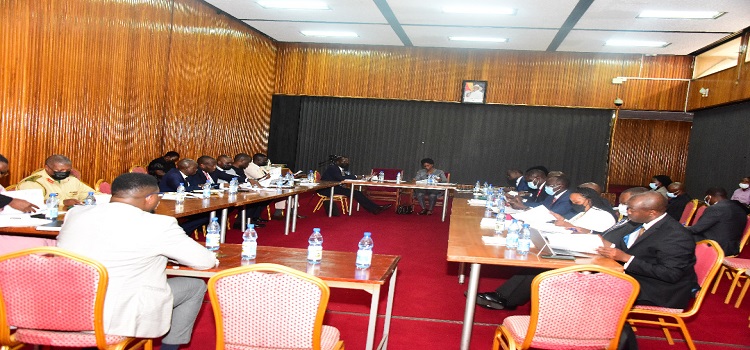 Hon Kyofatogabye (L) before the committee on Presidential Affairs
Hon Kyofatogabye (L) before the committee on Presidential AffairsLed by the State Minister for Kampala and Metropolitan Affairs, Hon. Kabuye Kyofatogabye, the KCCA officials were defending their ministerial policy statement for the financial year, 2022/23.
Kyofatogabye decried persistent budget cuts for KCCA over the last three financial years which he said have critically suffocated the operations and activities of the authority including remuneration of councilors whose number has risen from 258 to 464 following the implementation of new electoral reforms.
“The mainly affected areas range from administration, human resources to capital development. But the main issue regards the remuneration of political leaders where I have lost almost Shs20 billion. There was no allocation made towards the facilitation of political leaders in 2021/22 and this remains as a major unfunded priority for which we seek the committee’s indulgence,” Kyofatogabye said.
According to Kyofatogabye, the authority is seeking for additional Shs17 billion to facilitate the remuneration of KCCA political leaders.
Kyofatogabye told the committee that out of the required Shs17billion, Shs10.2 billion will be spent on councilors’ salaries, while Shs6.7 billion will be spent on other associated costs of allowances, furniture, and others.
“What brought the problem was the increase in the number of councilors. So the funds we had could only last for six months. So the Shs17 billion we are seeking is to clear them up to the end of the financial year so that we can budget properly in the next financial year,” Kyofatogabye said.
Among those affected include speaker and deputy speaker for KCCA and urban division councils whose emoluments cannot be processed due to a lack of a legal framework that spells out their salaries and allowances.
The KCCA Amendment Act 2015, which led to the establishment of the positions of speaker and deputy speaker at City Hall, is silent on the facilitation and emoluments of these leaders.
The Chairperson of the Committee on Presidential Affairs, Hon. Jesca Ababiku blamed the minister for reluctantly failing to table the amendment before Parliament for consideration.
“Usually when we pass laws, we expect them to be effectively implemented and if you face any challenges during implementation, then we expect you [KCCA] to let us know,” Ababiku said.
Hon Abubaker Kawalya (NUP, Rubaga North) thinks there is political foul play to sideline the welfare of KCCA speakers and their deputies.
“The law was amended in 2019 that put in place the office of the speaker and deputy both at the Authority and Divisions. The same law introduced other offices of executive secretaries for mayors and lord mayors, but when it came to the interpretation of the law by the Solicitor General, they disregarded the payment of the speakers and instead paid the executive secretaries,” Kawalya said.
Recently, Parliament guided that the KCCA Act should be amended to give the minister powers to determine the emoluments of the political leaders in the city hall and other divisions.
Kyofatogabye who shouldered the blame on behalf of KCCA told the committee that the authority is in the final stages of processing the amendment and has since received the Certificate of Financial implication.
KCCA also seeks Shs60 billion which remains a major unfunded priority over a five-year period, effective 2022/23 in order to implement the Kampala Integrated Waste Management Programme.
According to the KCCA ministerial policy statement for 2022/23, the funds are required to decommission the Kiteezi landfill and operationalize the new landfill at Dundu in Mukono to improve waste collection and disposal in the city.


